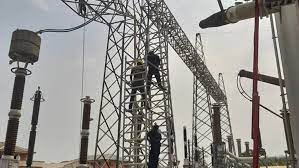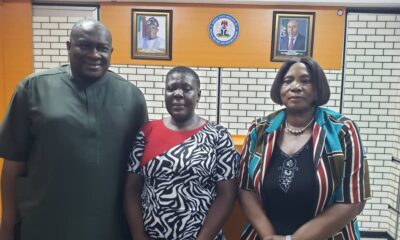Business
Inefficient Policies Impeding Power Sector Progress – Reps

The House of Representatives Committee on Power, has attributed the crisis in the power sector to lack of efficient and dynamic policies.
The Chairman of the Committee, Rep. Magaji Aliyu, said this on Wednesday in Abuja, at the third annual general meeting of the Association of Rural Electrification Contractors of Nigeria (ARECON).
Aliyu said that the relocation of certain parastatals and agencies under the ministry of power to other ministries was an aberration and one which was causing confusion in the sector.
According to him, there must be a desired formula that ensures that irrespective of inherent politics, the Minister of Power must be allowed to drive power processes in the country without interference.
“Today, you will hear that a particular part of ministry of power has been shifted to another organisation, which I believe is an aberration of the concept.
“For example, Nigeria Bulk Electricity Trading Company, there is a tug of war, where does the organisation belongs, is it in power or is it in Ministry of Finance, there is an issue of Hydro-Power Development Authority is it going to the presidency, or is this going to power?
“I believe that there are political machinations not to allow power grow in this country.”
He said it was understandable that the sector had multi-dimensional problems which were evident in distribution, transmission and generation.
Aliyu said that the problems in the sector were enormous as Nigerians were paying for the power they did not consume, a situation he said was undesirable.
He, however debunked strongly the allegation that lawmakers interfere in the procurement process in contract awards to contractors, saying it was untrue.
Former Chairman, Mr Sam Amadi, Nigerian Electricity Regulatory Commission (NERC), said that that one of the ways to improve the sector was to promote local content law to help industrialisation to begin the manufacturing of the equipments needed.
According to him, if this is realised, it will help local manufacturers to optimise production, create wealth and jobs.
On tariffs, he said there was need for regulatory credibility and stability, adding that independent regulators help to attract more investors into the sector.
“If you set up a group like this and empower them, you can set up and use them to ensure that there is little or no project failure.”
He advised ARECON members to organise themselves to be a real trading section in the sector as was obtainable in other sectors of the economy.
Amadi, also said that as a major player in the sector, they should build their capacity to be a voice to determine how policies ensures the growth of the sector.
Chairman of ARECON, Mr Uchenna Akubuobi said that since privatisation in 2013, the sector was yet to satisfy the yearlings of electricity consumers in Nigeria.
He said that some of the factors militating against achieving power sector goals were low daily generation, weak transmission grid resulting in frequent system collapse and vandalisation of electricity infrastructure.
Others are poor funding by private investors after the take over of the acquired assets and Distribution Companies (DISCOs) incapacity to take load from transmission stations.
“ARECON is prepared to work with the government to ensure that electricity gets to the rural communities within the shortest possible time.
“This will stem rural migration to cities and engender economic prosperity.”
He, however, urged the Federal Government to increase budgetary allocation to the Rural Electrification Agency to allow for more projects to the rural communities.
He added that a law should be enactedÎ to restrain any other government agencies from carrying out rural electrification projects in any part of the country.
Business
PETROAN Accuses Crude Oil Producers Of Diverting 500,000bpd Refineries-Bound Product
The Petroleum Products Retail Outlet Owners Association of Nigeria (PETROAN) has alleged that oil producers were diverting 500,000 barrels per day (bpd) of crude oil intended for local refineries.
The claim was made public on Wednesday amid ongoing discussions about the challenges facing Nigeria’s refining sector.
The association’s publicity secretary, Joseph Obele, who made this known, emphasised that the diversion of the crude allocations has led to the abandonment of many refineries, which were struggling to operate due to insufficient feedstock.
Obele accused oil producers of prioritising quick foreign exchange gains over compliance with domestic supply obligations.
The PETROAN spokesman commended the Nigerian Upstream Petroleum Regulatory Commission (NUPRC) for recently banning the export of crude oil allocated for domestic refining, a move they believed will enhance local refining capabilities and reduce the nation’s reliance on imported petroleum products.
He said, “Approximately 500,000 barrels of crude oil per day are allocated for domestic refining, but these volumes often find their way to the international market”.
The situation has prompted calls for immediate action against both producers and companies that fail to adhere to the new regulations.
The issue has sparked a heated debate among industry stakeholders. While oil producers argue that local refineries often do not meet commercial terms, refiners counter that producers are neglecting their supply commitments in favour of international markets.
This ongoing blame game complicates efforts to stabilize local crude supply and improve refinery operations.
PETROAN’s national president, Billy Gillis-Harry, urged swift enforcement of the export ban to ensure that local refineries receive their fair share of crude oil.
He expressed optimism that this policy could lead to a more self-sufficient refining sector in Nigeria, ultimately benefiting consumers through reduced prices and improved product availability.
Business
FG Targets Reduction In External Borrowing
The Federal Government has said it is committed to reducing reliance on external debt financing and promoting private sector-driven economic growth as part of its strategy for long-term fiscal stability.
The Minister of Finance and Coordinating Minister of the economy, Wale Edun, who made this known during a meeting with World Bank executive director, Dr. Zainab Shamsuna Ahmed, emphasised Nigeria’s shift towards alternative financing sources and investment-friendly policies.
He acknowledged the World Bank’s role in Nigeria’s development but stressed that the government is prioritizing a business-friendly environment to encourage private-sector investments.
“Our focus is on reducing dependency on external borrowing while ensuring that Nigeria’s economic policies foster long-term, private-sector-led growth”, he stated.
In his response, Dr. Ahmed, who previously served as Nigeria’s Minister of Finance, commended the country’s ongoing macroeconomic reforms, which she said have boosted fiscal stability and investor confidence.
Ahmed also noted the World Bank’s recent financial reforms, which have increased its lending capacity, making an additional $150 billion available over the next decade.
A key highlight of the meeting was Nigeria’s role in “Mission 300”, the World Bank’s initiative to provide electricity access to 300 million Africans.
Edun reaffirmed that power infrastructure remains a top priority for the government, as it is critical to economic growth, industrial expansion, and private-sector competitiveness.
“Electricity access is a game-changer for Nigeria’s economy, and we are committed to playing a leading role in Mission 300 to ensure sustainable development”, he said.
He further emphasised that President Bola Tinubu remains dedicated to strengthening Nigeria’s economic foundation, shifting away from external borrowing, and fostering a resilient, investment-driven economy.
Business
Dangote Refinery Exports Jet Fuel To Saudi Aramco
Dangote Petroleum Refinery had exported two jet fuel cargoes to Saudi Aramco, the world’s largest oil producer and a leading integrated oil and gas company globally.
Saudi Aramco is a majorly state-owned petroleum and is the national oil company of Saudi Arabia.
President of Dangote Group, Aliko Dangote, disclosed this during a visit by a team of the Nigerian Economic Summit Group (NESG) to both Dangote Fertiliser Limited and the Dangote Petroleum Refinery & Petrochemicals in Ibeju Lekki, Lagos.
He said exporting products to the global markets, especially Saudi Aramco, was because of his refinery’s world-class standards and advanced technology.
“We are reaching the ambitious goals we set for ourselves, and I’m pleased to announce that we’ve just sold two cargoes of jet fuel to Saudi Aramco”, he said.
According to him, since it began in 2024, the refinery has steadily increased its output, reaching 550,000 barrels per day.
While commending Aliko Dangote for establishing the $20 billion refinery – the largest single-train refinery in the world – NESG Chairman, Mr. Niyi Yusuf, stated that Nigeria needs more investments of this calibre to reach its $1 trillion economic goal.
“To achieve a $1 trillion economy, much of that must come from domestic investments. I joked during the bus ride that while others are dredging to create islands for leisure, you’ve dredged 65 million cubic tonnes of sand to create a future for the country.
“This refinery, fertiliser plant, petrochemical complex, and supporting infrastructure are monumental.
“My hope is that God will grant you the strength, courage, and health to realise your ambitions and that in your lifetime, a new Nigeria will emerge”.
Yusuf emphasised that such local industries are essential to Nigeria’s industrialisation and will help foster the growth of Small and Medium Enterprises (SMEs).
He said NESG would continue to advocate for improved investment climate to attract entrepreneurs, boost development, ensure food security, and address insecurity.
He lamented that Nigeria has become a dumping ground for foreign products, stressing that the country must support its entrepreneurs to become a global player.
“It’s inconceivable that a nation of over 230 million people, with an annual birth rate higher than the total population of some countries, is still dependent on imports to feed its citizens”, he stated.
Yusuf also praised Dangote’s bold vision for making Nigeria self-sufficient in several key sectors.
“The NESG is grateful, and I believe the nation is as well. This refinery represents the audacity of courage. It takes immense effort to do what you’ve done and still be standing and smiling.
-

 News2 days ago
News2 days agoNigeria Strengthens Economic Ties With Germany To Boost Investment, Jobs
-

 Featured2 days ago
Featured2 days agoFubara Flags Off Upgrading Of 135 Primary Healthcare Facilities In Rivers
-
Rivers2 days ago
Bonny Protest Neglect, Seeks CSR MoU Implementation
-
Nation2 days ago
FG Begins Tolling On Abuja-Keffi-Akwanga-Makurdi Highway
-
Business2 days ago
NDYC Seeks NDDC Commercialisation … Uncompleted Projects Completion
-
Business29 mins ago
NDDC Trains 364 Young Farmers In Agribusiness
-

 Rivers2 days ago
Rivers2 days agoCommissioner Promises Improved Working Conditions … Splashes N.1m On Outstanding Caregiver
-
Sports2 days ago
Sports: 2nd Edition Of Inter-Tribal Tourney Kick-starts In Mbiama

